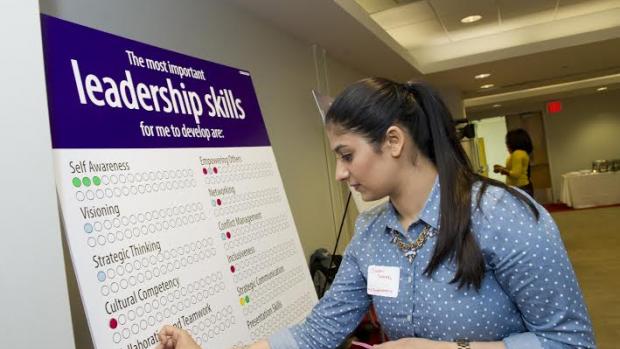Transformational Leadership: It’s What’s for Dinner

In conjunction with National Women's History Month, the Regna Lounge elegantly supplied the backdrop for the recent Women’s Summit Leadership Dinner. Attendees dined on tasty dishes served on white-table cloths, and parted with a little food for thought. An initiative of the Division of Student Affairs, the Women’s Summit—an effort that has grown from a day in 2012 to a full week of presentations and activities—aims to empower women students by forging connections with faculty, alumna and their peers involved in the fields of science, technology, engineering and mathematics (STEM).
The theme of this year’s Summit, “Transformational Leadership: Women and the Future of STEM,” brought together a collective of accomplished women who shared their personal experiences in response to prompts covering what it looked like to utilize and recover from failure, take risks, and reframe roles, all in the name of leadership.
So what exactly is transformational leadership?
“I think it’s kind of overwhelming for people when you say it, but for me, it’s seeing the process of leadership and being a leader, as something that’s about the community you’re in,” said Alicia Erwin, Director of Student Activities. “It’s figuring out how to bring people together around a common goal and then working towards that.”
From the opening remarks made by Professor Kristen Day, it was clear this event would be a demonstration of the term itself. Day affirmed that “women in STEM have a unique capacity to be successful as leaders and bring something unique to the table as leaders,” before a roster of speakers stood at a podium as living testimony. In addition to Day, Professors Mina Teicher, Vittoria Flamini, Jin Montclare, Bethany Godsoe and students, Stephanie Serrano and Abigail Yuklis took center stage to share their triumphs and troubles in their respective fields.
Stephanie Serrano, a senior in chemical engineering, opened up about a high school instructor who told her she’d never make it as an engineer, and watching her Hispanic peers fall away as she progressed in her studies—just a few of the bumps in the road she’s faced on her journey.
“I dare to believe in myself, that I’m destined for great things. I know that along the way I’m going to fail. It’s part of life. But do I let that failure take over and give up or do I learn from it?” said Serrano. “Leadership is a process and everything you do, you’re going to learn from it and it’s going to make you better. As long as I keep that in my mind, I know I’m going to be successful in whatever I do.”
Abigail Yuklis, a master’s candidate in Integrated Digital Media, has also seen her share of failures but like Serrano, chooses to view them as learning opportunities.
“You can fail successfully if you set yourself up to,” Yuklis said. “You just have to be prepared to fail fast, fail early and fail often then learn from those failures.”
Between speakers, with the help of student facilitators, dialogue between the attendees as each table was encouraged. The room buzzed with conversation and sparks of innovation. Strangers learned from one another, becoming less strange as the night went on.
“There’s so much opportunity,” said Yuklis. “It’s great to see women coming together to help one another out and build that sense of leadership and community.”
In closing, Dean Anita Farrington took to the podium and offered heartfelt remarks to the attendees and presenters that captured what had taken place over the meal and shared experiences, a different kind of nourishment.
“This evening is an extraordinary success because of all of you. Because of your willingness to step up and add to the conversation. Who knew you were going to walk into this dinner tonight…and truly engage?” said Farrington. “Part of meaningful engagement means you look inside yourself, take that risk and open up your hearts and give a little bit of yourself. My hope is that when you walk through those double doors you take some of this with you.”




